Iranian-Backed Cyber Group Hacks Water Booster Station In Pennsylvania
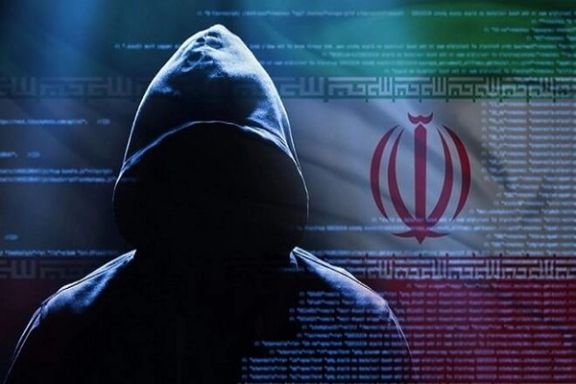
The Aliquippa Municipal Water Authority in Pennsylvania revealed one of its booster stations had fallen victim to a cyber-attack by an Iranian-backed group.

The Aliquippa Municipal Water Authority in Pennsylvania revealed one of its booster stations had fallen victim to a cyber-attack by an Iranian-backed group.
Matthew Mottes, Chairman of the Board of Directors for the Municipal Water Authority, disclosed to KDKA-TV that the hacking group, identified as Cyber Av3ngers, successfully took control of the station, setting off an immediate alarm.
The station, located on the outskirts of Aliquippa, plays a crucial role in managing pressure for Raccoon and Potter Townships. Mottes sought to allay public fears by affirming that, as of now, there is no identified risk to the drinking water or water supply.
The compromised system operated on a Unitronics platform, with Mottes highlighting the ownership of certain software or components by Israel. Subsequent to the breach, the system has been deactivated, and the Pennsylvania State Police have been called in to conduct a thorough criminal investigation at the booster station.
CyberAv3ngers has claimed responsibility for a series of global cyber assaults including on Iran’s archenemy Israel. As of October 30, their X page detailed attacks on ten water treatment stations in Israel in the midst of the Gaza war.
In September, the group claimed involvement in an alleged cyberattack targeting Israel's railroad network, disclosing sensitive information about its electrical infrastructure.
However, the railway operator refuted the occurrence of any cyberattack. The hacktivist collective also took credit for disabling the website of Israel's largest oil refinery, BAZAN Group in July, accompanied by the release of purported screenshots depicting the company's internal systems.
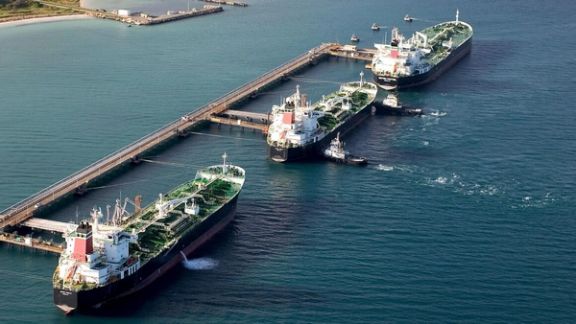
Iran's draft budget for 2024-2025, presented to the parliament, reveals a significant decline in oil and gas export revenues, and a surge in domestic energy prices.
The bill outlines a projection of 1.35 million barrels per day for oil exports at an average price of €65 per barrel (approximately $71) in the upcoming fiscal year (starting March 21), representing a 10% reduction in volume and a 16% decrease in prices compared to the current year's budget. Despite these cuts, the overall forecast for oil revenues in the budget indicates only a 3% decrease from the current year, signaling a substantial increase in domestic energy prices, particularly impacting industries, businesses, and households.
Davoud Manzoor, the head of the Planning and Budget Organization, recently disclosed a 40% overestimation in oil export revenues for the current year, leading to a significant budget deficit. This suggests a shift toward raising domestic energy prices due to disappointment with oil export revenue growth, contradicting claims by Iranian oil officials, including the Minister of Oil, about an increase in the country's oil production and exports.
International reports in August and Iranian official statements had indicted that daily exports had well surpassed 1.5 million barrels, but next year’s budget projection is based on the lower number.
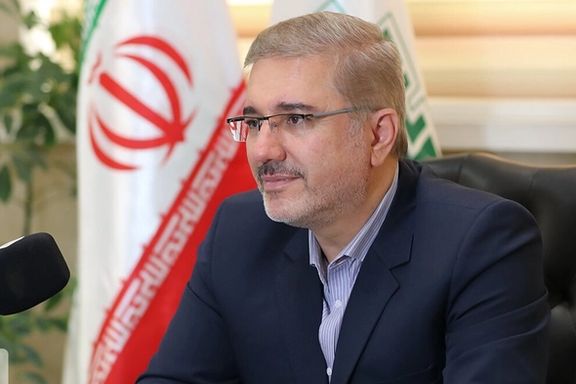
Data from the commodity intelligence company Kpler and energy consultancy firm Vortexa suggest that Iran's daily oil exports to China have remained below 1.05 mb/d in ten month of 2023. Despite a notable summer increase, shipments declined in the fall.
Additionally, recent US legislation intensifying sanctions on Iranian oil, if implemented, could further restrict Iran's oil exports.
The draft budget for this and the next fiscal year does not distinguish revenues from the domestic and foreign sale of oil and gas. However, the government's forecast of a 50% surge in next year’s tax revenues indicates that the Raisi administration aims to place a greater burden on the Iranian people to compensate for budget deficits.
Achieving expected oil revenues: aspiration or reality?
The Parliament Research Center has predicted that this year's government budget will face a deficit of 4,250 trillion rials ($8.5 billion based on USD rate in Iran’s open market). This equals to 20% the current year’s budget. In recent years, Iranian governments, to compensate for budget deficits, have significantly increased taxes on people, traders, and industries, in addition to borrowing heavily from financial institutions and banks.

The Raisi administration also plans to increase the sale of bonds by 36% year-on-year to 2,550 trillion rials. For better comparison, the amount of government debt from the sale of bonds for the coming year alone will be equivalent to half of the total revenues from oil and gas exports and domestic sales.
International Monetary Fund (IMF) statistics show that government debt has sharply increased in recent years, reaching 34% of the GDP in 2022, or 118 billion dollars.
In the current fiscal year, the Iranian government has projected daily oil exports at 1.35 million barrels per day (mb/d) with a price of $71 per barrel. However, Iran's actual daily oil exports to China, its main customer, hover just above one million barrels, and despite current global oil prices reaching around $74 per barrel, Iran offers a discount of about $12 per barrel to Chinese refineries. Consequently, approximately 30% of Iran’s oil export revenues are lost due to sanctions evasion and discounted sales to Chinese refineries.
As a result, not only is it unlikely that the targeted volume of oil exports will be realized in the budget for the next fiscal year, but achieving the predicted price for Iran's oil exports is also improbable. In essence, the government is anticipated to face a considerable budget deficit in the upcoming year. The International Monetary Fund has forecasted that, to avert an Iranian budget deficit for the next fiscal year, global oil prices would need to exceed $317 per barrel.
Natural Gas Exports
In the current fiscal year, the Iranian government has set a target of 1.35 million barrels per day (mb/d) for daily oil exports, with a projected price of $71 per barrel. However, Iran's actual daily oil exports to China slightly surpass one million barrels. Despite global oil prices reaching approximately $74 per barrel, Iran provides a discount of about $12 per barrel to Chinese refineries. This results in an approximate loss of 30% of Iran’s oil export revenues due to sanctions evasion and discounted sales to Chinese refineries.
As a consequence, not only is it improbable that the targeted volume of oil exports will be achieved in the budget for the next fiscal year, but attaining the predicted price for Iran's oil exports is also unlikely. Essentially, the government is expected to confront a significant budget deficit in the upcoming year. The International Monetary Fund has forecasted that, to prevent an Iranian budget deficit for the next fiscal year, global oil prices would need to surpass $317 per barrel.
Dr. Umud Shokri, Energy Strategist and Senior Visiting Fellow at George Mason University
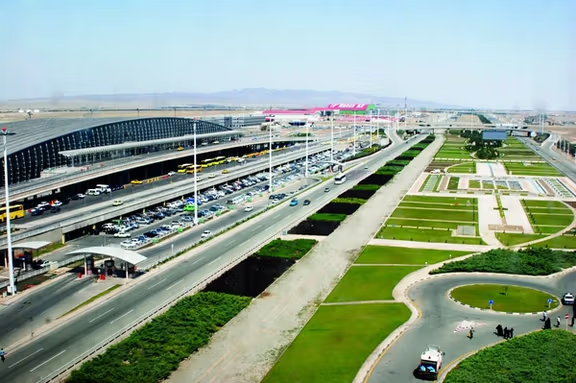
Amid ongoing economic crisis, Iran has revealed an expansion plan for its main international gateway in Tehran, with the construction to be awarded to the Revolutionary Guard.
Iran's Minister of Roads and Urban Development, Mehrdad Bazrpash, declared on Saturday that China is set to invest €2 billion in the construction of the second phase of Imam Khomeini International Airport.
Bazrpash urged private sector companies to collaborate in the implementation of this substantial project.
The first phase of IKIA's development, according to him, with a budget of $500 million, is scheduled to become operational in March 2025.
Bazrpash further asserted that a Chinese company would contribute over €2 billion for the completion of the second phase's construction.
Earlier statements from Saeed Chalandari, the CEO of IKA (Imam Khomeini Airport Company), revealed that the construction contract was signed with an undisclosed Chinese company after negotiations with various domestic, and international contractors. However, IRGC officials said on Saturday that their construction company will be the main builder.
However, the backdrop of this development is accusations against several Iranian airlines, including Mahan Air, linked to the Islamic Revolutionary Guard Corps (IRGC). The airlines have faced bans from countries such as the US and France, for their alleged involvement in transporting military equipment and personnel to conflict zones in the Middle East.
Despite a touted 25-year strategic partnership agreement between China and Iran, Tehran has found itself somewhat excluded from Beijing's Belt and Road Initiative and other regional investments, largely due to US sanctions. Notably, China has only inked two investment agreements with Iran from 2013 to 2023, and one of them was canceled in 2018 when the United States withdrew from the JCPOA nuclear agreement with Iran.
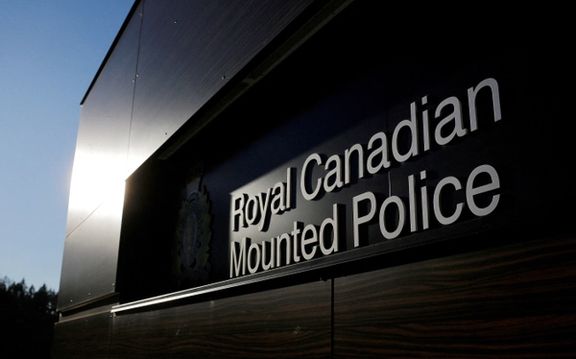
A jury has found Cameron Jay Ortis, a former intelligence official of RCMP, the Canadian equivalent of FBI, guilty of breaching Canada's secrets law.
The trial, described as “unprecedented” by Canadian outlet Global News, followed Ortis’ arrest in 2019 which “sent a shockwave through the Canadian security and intelligence community”.
Jurors declared Ortis guilty of three counts of violating the Security of Information Act and one count of attempting to do so.
Prosecutors argued that not only had Ortis passed information to international criminals and money launderers connected to Iran but was also in possession of classified files which could have only been of interest to foreign states and that he was on cusp of sharing them just before his arrest in 2019.
According to court documents, from at least 2014, the RCMP and multiple intelligence agencies of Canada's close allies were investigating money laundering activities conducted by various entities associated with Altaf Khanani, a Dubai-based money service businesses owner.
These included Salim Henareh and his companies Persepolis International and Rosco Trading, Muhammad Ashraf and his company Finmark Financial, and Farzam Mehdizadeh and his firm Aria Exchange who were all subjects of the investigation in Canada.
Mehdizadeh, who reportedly once owned the biggest Iranian exchange bureau in Canada, was arrested in 2016 and fled to Iran after being released on bail.
Ortis, 51, had pleaded not guilty to all charges and testified that he offered secret material to targets in a bid to get them to use an online encryption service set up by an allied intelligence agency to spy on adversaries.
The prosecuting team argued Ortis lacked authority to disclose classified material and that he was not doing so as part of a sanctioned undercover operation.
Prosecutor Judy Kliewer suggested the Crown would seek a prison sentence of 20 or more years.
Ortis was arrested in September 2019. A civilian with a PhD in international relations, he was at the time the director of the RCMP’s national intelligence co-ordination centre in Ottawa, with access to Canada’s Top-Secret Network (CTSN), a computer network used by the federal government to share classified information. CTSN held intelligence from Canada’s allies in the Five Eyes, an intelligence-sharing network that includes the US, Australia, New Zealand and the United Kingdom.
The trail to his arrest began the previous year when the RCMP analyzed the contents of a laptop owned by Vincent Ramos, CEO of Phantom Secure Communications, who had been apprehended in the United States. His company provided criminal organizations with encrypted mobile phones.
The jury was told that RCMP investigators found emails to Ramos from Ortis offering classified information to in exchange for $20,000.
Moreover, federal prosecutor Judy Kliewer alleged Ortis was in the final stages of a plan to pass state secrets to a “foreign entity” as well.
CBC reports that before his arrest, Otis’ home had been raided secretly, and just on one laptop, investigators found 488 secret files. Some had their headers removed and turned into PDF documents, hence untraceable, and ready to be shared. They also found searches for Chinese and other diplomats and embassies.
"Given the nature of the documents … these are no longer organized crime directed documents. These are all documents that related to national security and would only be of interest to a foreign entity,” the prosecution argued.
Reacting to the conviction, Canadian daily Globe and Mail declared that the outcome of the trial suggests that the Canadian judicial system passed an “extraordinary test”.
According to Wesley Wark, “for Canada’s intelligence and law enforcement partners, who share national security concerns about transnational organized crime, money laundering and possible terrorism linkages (Iran lurked in the background of this case), the Ortis trial had Canada on trial”.
“Even with the successful outcome of the trial, that trust will remain fragile, while the RCMP works to improve its internal security,” writes Wark.
As for the Iranian media, the news does not seem to have been covered inside the country, with headlines still dominated by the war in Gaza. State run news agencies such as IRNA and Fars did report on Otis’ arrest in 2019, albeit without mentioning any links to Iran in the investigation.
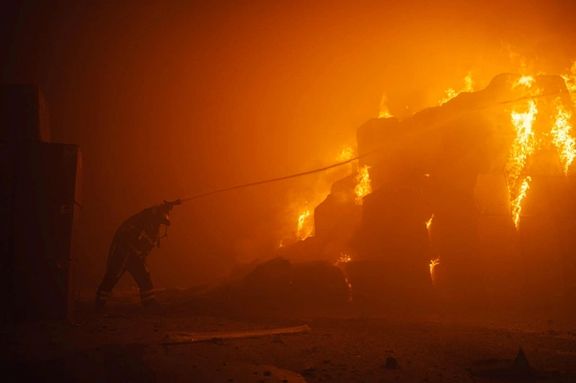
Russia launched its most extensive kamikaze drone attack against Ukraine's capital, Kyiv, on Saturday using dozens of Iranian Shahed Unmanned Aerial Vehicles.
The attack injured five people, disturbing the early morning tranquility with the sounds of air defenses and explosions.
The assault began in the early hours, targeting various districts of Kyiv and persisting in waves as daylight emerged, with the air raid alarm lasting for a prolonged six hours.
Iran has supplied hundreds of kamikaze drones to Russia since mid-2022. The drones have been extensively utilized to target civilian infrastructure and cities, integrated into large-scale missile attacks to overwhelm Ukrainian air defenses.
Despite Iran's denial of involvement in supplying drones and other weaponry to Russia, the United States and NATO allies have imposed sanctions on individuals and entities associated with these drone shipments.
Initially, Ukraine's air force reported successfully intercepting 71 out of 75 drones, later revising the number to 74. A spokesperson clarified that 66 of the drones were brought down over Kyiv and its surroundings. Air force chief Mykola Oleschuk credited the effectiveness of 'mobile fire' units—fast pickup trucks equipped with machine guns or flak cannons—for downing nearly 40% of the drones.
Kyiv Mayor Vitali Klitschko, communicating via the Telegram app, confirmed five injuries, including an 11-year-old girl, and widespread building damage across various city districts. A fire in a children's nursery was sparked by a fragment from a downed drone.
President Volodymyr Zelenskiy condemned the attack as "willful terror," accusing the Russian leadership of taking pride in causing harm.
While the exact target of Saturday's attack remains unclear, Ukraine had previously warned of a potential Russian aerial campaign targeting Ukraine's energy system, similar to attempts last winter.

Reports highlight a significant reduction in Iran's pistachio exports to European Union countries and China from January to September.
According to Eurostat data, Iran's pistachio exports to EU member states have decreased by 29%, amounting to a reduction of 67 million euros compared to the same period last year.
Iran had exported 95 million euros worth of pistachios to Europe by the end of September 2022. The breakdown included 49 million euros for shelled pistachios and 18 million euros for pistachios with shells.
Iran, after the United States, stands as the second-largest pistachio exporter to Europe from January to September 2023, with the US exporting 439 million euros worth of pistachios during the same period.
Germany remains the primary buyer of Iranian pistachios in Europe for the first nine months of 2023.
Simultaneously, based on Chinese customs data, Iran's pistachio exports to China have reached 20 million dollars during the period, indicating a 59% decline compared to the same period last year.
Iranian media attribute the decline to drought conditions and stringent regulations demanding that exporters repatriate their foreign currency earnings and exchange with Iranian currency at lower government rates.
Beyond pistachios, Iran has faced a downturn in other export products in recent years. In November, a member of Iran's Chamber of Commerce, warned that the country's carpet exports had reached a four-decade low, amounting to only half of the total production.
Despite initial promises by the President Ebrahim Raisi's government to boost non-oil exports, the commitment has not materialized as anticipated.